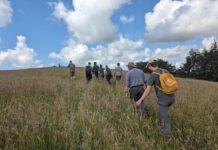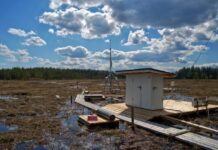
Ecological organisations across all sectors and specialisms are invited to upload their research, reports and grey literature* to the British Ecological Society’s new open access platform, Applied Ecology Resources (AER), in a bid to improve knowledge sharing and collaboration across the ecological community.
AER enables a range of organisations, scientists and practitioners working across research, policy or practice to pool their knowledge relating to ecological science in a permanent, secure and fully searchable space.
With a broad international information base, AER is home to both peer reviewed and non-peer reviewed reports, data reports, research summaries, and other grey literature, all of which is publicly accessible. AER is also home to the peer-reviewed open platform journal Ecological Solutions and Evidence (ESE) which offers a unique suite of article types, all of which promote open science and provide a platform for practitioners to communicate with a broad audience.
At its heart, AER promotes evidence-based decision-making and all content on AER is freely accessible and permanently archived, even welcoming documents written in most languages.
Commenting on the inspiration behind AER, Marc Cadotte, Editor-in-Chief, said: “A lot of people who are interested in Applied Ecology tend to work at a really small scale on specific species or in specific systems. From a data-sharing perspective, there’s often a disconnect between what people are pursuing in terms of the best research, and what people might actually be interested in on the ground.”
“This led me to the idea of trying to create something that was more tailored for practitioners, in terms of the types of information they need, how they communicate that and how they share the information that they’re producing. AER fills quite a significant gap as prior to this, we weren’t getting as much information from practitioners.”
Appealing to both small and large organisations within ecology, AER offers the opportunity to share important information between practitioners, allowing for a more cohesive scientific community within ecology to emerge.
“There’s a lot of lost knowledge and experience in Ecology. We hope that AER is part of this changing nature of how practitioners communicate and share their experiences. Our hope is for AER to become part of this culture change, and become routine practice for how activities are documented,” Cadotte added.
AER has been growing in popularity since its inception, with organisations especially supportive of its evidence-based approach to information.
David O’Brien, Policy and Advice Manager at NatureScot, said: “There is such an obvious need for AER and the information that’s on AER is designed to be useful. It’s readily accessible to anyone who has got a large piece of land or a project to make a decision on quickly and wants to ensure it delivers the best outcome.”
Moreover, Chris Nichols, Conservation Evidence Manager at The Woodland Trust highlighted that: “In the conservation and NGO sector, there tends to be a reliance on certain key partners. AER is helping to broaden that network to include more diverse partners, resulting in better rounded viewpoints. It’s really helping to break down some of those perceived barriers between different areas of the sector as well, so that we don’t just operate in our own little echo chamber.”
In addition to the AER platform, AER Live offers applied ecologists with a series of free online workshops across research, policy and practice. More details as well as information on how to get involved can be found here.
For more information on AER, visit www.britishecologicalsociety.org/applied-ecology-resources/
* The term is often used to refer to material published outside of traditional publishing and distribution channels, and encompasses a vast range of documentation produced by government, academic, industry, and specialist groups.








